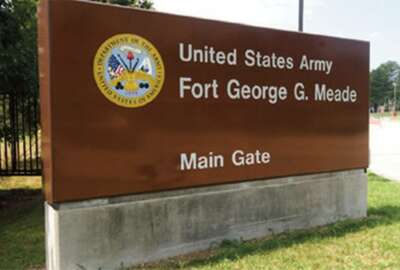
Senate bill looks to ensure coronavirus spending watchdog hits the ground running
In today's Federal Newscast, a bipartisan bill in the Senate would fast-track hiring staff to work for the Special Inspector General for Pandemic Recovery, who�...
To listen to the Federal Newscast on your phone or mobile device, subscribe in PodcastOne or Apple Podcasts. The best listening experience on desktop can be found using Chrome, Firefox or Safari.
- A bipartisan bill in the Senate would fast-track hiring staff to work for the Special Inspector General for Pandemic Recovery, who’s now one step away from confirmation. The bill, led by Senator Chuck Grassley (R-Iowa), would expedite federal hiring and contracting authority for the special IG, and would allow the watchdog office to accept volunteers and detainees from other government agencies. The bill also incentivizes hiring back retired federal employees with relevant experience, and waives penalties for re-hiring former feds to receive a government pension. The Senate Banking, Housing and Urban Affairs Committee approved former GSA watchdog Brian Miller for the special IG role. The nomination now heads to the Senate floor.
- House Appropriations Committee member Rosa DeLauro (D-Conn.) presses the Census Bureau for next steps on its coronavirus pandemic surveys. The congresswoman asks the bureau when Congress will get briefed on findings from the household pulse survey, and whether it will impact appropriations for fiscal 2021. The bureau’s earliest findings show that nearly half of responding households saw lower employment income since mid-March. More than 10% of respondents say they’ve missed rent or mortgage payments during the pandemic.
- 29 House Democrats are calling on the leaders of the House Armed Services Committee to lower the authorized defense budget for 2021. The lawmakers say the government must remain focused on coronavirus response and needs to increase the budget of non-defense funds to do that. The letter says the money needs to go toward efforts like testing, vaccines and developing therapies.
- The American Federation of Government Employees says it’s looking for immediate relief from a federal district court, because it fears the impasses panel will rewrite much of its bargaining agreement with the Department of Veterans Affairs. The Federal Service Impasses Panel is reviewing almost 60 articles that VA and AFGE can’t agree to. A decision from the impasses panel is due sometime after July 5. Meantime, AFGE says some of its locals are paying rent to occupy agency office space after a VA directive. Many more moved out and found new space outside the department’s facilities. (Federal News Network)
- The Senior Executives Association has a new temporary president. SEA named Bob Corsi to be its interim leader. He’ll replace Bill Valdez, who resigned from SEA last month. Corsi will help SEA find a new permanent president. He was a long-time career senior executive for the Air Force. He spent 28 years in active-duty and another 18 years in the Air Force as a civilian. Corsi handled manpower, personnel and facilities for the Air Force in the national capital region. (Federal News Network)
- John Felker of the Cybersecurity and Infrastructure Security Agency and Chris Cleary, the Navy’s chief information security officer, are leading a who’s who of cybersecurity experts in the first class of senior fellows at Auburn University’s McCrary Institute. The 30 current and former federal and private sector cybersecurity executives will help develop practical solutions to national security challenges. The cohort will focus on policy, technology, research and education initiatives over the next year.
- A new ombudsman’s office in the Labor Department reports rising activity only two weeks into the launch. The Office of Federal Contract Compliance Programs says it’s already received close to 60 referrals. The ombudsman, Marcus Stergio, says the program was set up in response to a GAO recommendation. Contractors had expressed worry about having to raise concenrs with the agency that reviews their labor and employment practices. Stergio says the office operates independently of the OFCCP’s front office or senior leadership, and that referrals are treated confidentially.
- The National Institute of Standards and Technology is taking a forward looking approach for how to secure 5G. The National Cybersecurity Center of Excellence at NIST will develop a Cooperative Research and Development Agreement or CRADA with private sector companies to tackle how best to secure products and services that use 5G. Under the agreements, NIST will work with experts who will provide products and technical expertise to support and demonstrate security platforms for the 5G Cybersecurity: Preparing a Secure Evolution to 5G project. NIST says the proposed proof-of-concept solution will integrate commercial and open source products based on cyber standards to showcase 5G’s security features. (Federal Register)
- The Pentagon says base commanders need to show promising data before they can begin easing coronavirus-related restrictions on bases. A memo from Defense Secretary Mark Esper tells local military leaders that installations need to show a downward trajectory in COVID-19 cases and symptoms before they can get rid of some of the rules put in place to stop the spread of coronavirus. Commanders must also show that local hospitals and military treatment facilities have enough capacity and testing for the military community and healthcare workers. (Federal News Network)
- The U.S.S. Theodore Roosevelt is back at sea for the first time since March. For now, the carrier is conducting training exercises with a limited crew of about 3,000 people. Another 1,800 sailors are still on Guam, working through the aftermath of a major coronavirus outbreak on the Roosevelt. The ship will spend another two weeks conducting requalification drills before it heads back to Guam to reembark the rest of the crew. Assuming no other problems, the Roosevelt will get back to the Pacific missions it had been assigned to before the virus sidelined it. (Federal News Network)
Copyright © 2024 Federal News Network. All rights reserved. This website is not intended for users located within the European Economic Area.
Eric White
Eric White is news anchor and Federal Drive producer at Federal News Network.
Follow @FEDERALNEWSCAST
Related Stories
Related Topics
Agency Oversight
All News
American Federation of Government Employees
Brian Miller
Chuck Grassley
Congress
Covid-19
Cybersecurity and Infrastructure Security Agency
Federal Drive
Federal Newscast
Hiring/Retention
House Appropriations Committee
House Armed Services Committee
Labor Department
National Institute of Standards and Technology
People
Rosa DeLauro
Senate Banking Housing and Urban Affairs Committee
Senior Executives Association
Tom Temin
USS Theodore Roosevelt
Workforce





